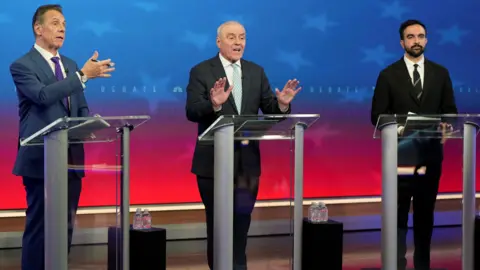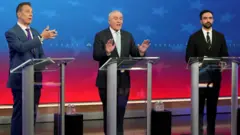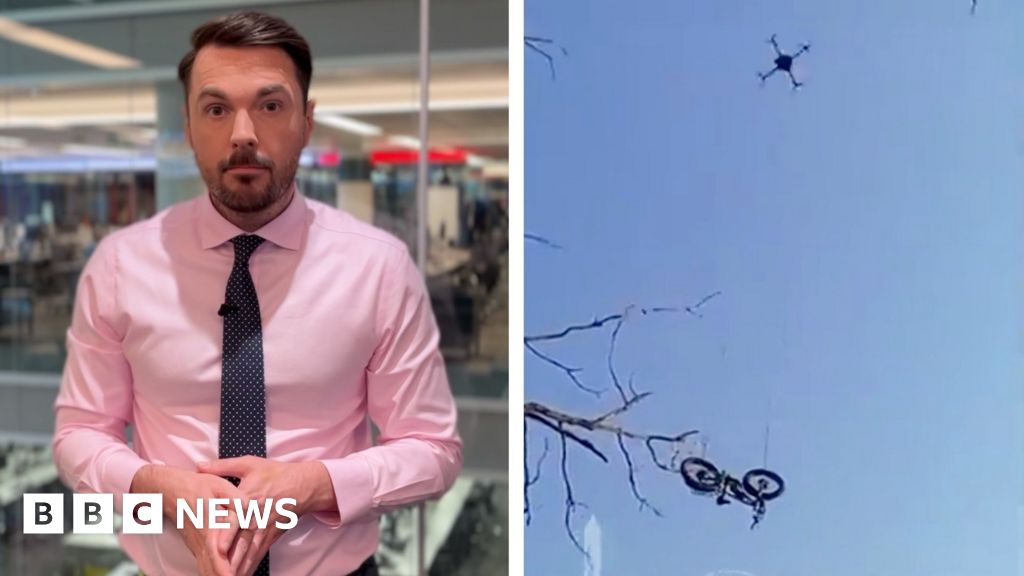Kayla EpsteinRockefeller Center,
Grace Eliza GoodwinRockefeller Center and
Sakshi Venkatraman
The three leading candidates for New York City mayor took the stage at Rockefeller Center in Manhattan on Thursday to make a case to lead America’s biggest city.
Early voting in the race is set to begin next week, and the most recent polling suggests Zohran Mamdani has widened his lead to 46%, while Andrew Cuomo stands at 33%.
The outcome of the race could have political implications beyond the Empire State as President Donald Trump looms large, and whoever wins will likely face pressure from Washington in some form.
The Democratic Party nationally is likely watching to see if the America’s biggest Democratic stronghold chooses an establishment, centrist figure in Cuomo – who is running as an independent – or the progressive Mamdani.
The winner could help determine the kind of candidate and platform Democrats choose in the future following their staggering 2024 loss to Trump.
Republicans also will watch to see if their candidate, Curtis Sliwa, continues to make inroads with his public safety platform.
Here are five big takeaways from tonight’s debate.
Mamdani pressed on views on Palestinians
Mamdani’s past statements on Israel and Palestinians came up several times during the night in both questions from moderators and opponents’ criticisms.
The candidate has stressed his support for Palestinians and statehood, and has criticised Israel’s military operation in Gaza.
He also was criticised for declining to condemn the phrase “globalise the intifada” when probed by interviewers. Many Jews argue this slogan is an antisemitic call for violence, but pro-Palestinian activists say it is a call for international solidarity with Palestinians.
Mamdani said he would seek to serve as a mayor for all New Yorkers, including its large and ideologically diverse Jewish population.
Cuomo attacked Mamdani for his views, calling the New York state assemblyman a “divisive personality across the board”.
 Angelina Katsanis/Pool via REUTERS
Angelina Katsanis/Pool via REUTERSThe fourth man: Donald Trump
There were three candidates at tonight’s debate but a fourth name kept coming up: Donald Trump.
The president has implied he wants to send the National Guard into cities controlled by Democrats and has moved to withhold government funds for infrastructure projects in New York City.
Trump has also prioritised the city for his mass deportation policy, and the mayor — who has little power over federal immigration enforcement — will likely have to weigh the city’s response.
Sliwa, the Republican, noted that the mayor would need to get along with Trump regardless of political views. But Mamdani made his opposition to the president explicit from his very first response, promising to “take on Trump.”
Cuomo, meanwhile, positioned himself as the only candidate experienced enough to deal with the current White House, warning “it will be Mayor Trump” if Mamdani is elected.
“I fought Donald Trump,” he told voters. “When I’m fighting for New York, I am not going to stop.”
Affordability front and centre
As large as Trump looms, the biggest policy issue around this mayoral election is affordability. New Yorkers face high costs of living on everything – especially rent and groceries.
In his opening statement, Sliwa acknowledged the “really serious issues of affordability” facing the city. He called for the next mayor to free up vacant apartments in NYCHA – New York’s public housing programme — and allow people to move in.
The moderators directly asked each candidate how much they paid for rent, groceries and whether they paid off credit card debt monthly.
The candidates pitched a volley of proposals to tackle the cost of living, including Mamdani’s plan to make buses free and Cuomo’s proposal to place income limits on people who resided in rent-stabilised apartments.
Cuomo criticised Mamdani for living in a rent-stabilised apartment -a form of affordable housing – even though his parents are wealthy (his mother is the filmmaker Mira Nair).
Cuomo also opposed Mamdani’s proposed rent freeze on stabilised apartments, saying it would only postpone future increases, force building owners into bankruptcy, and fail New Yorkers who don’t live in rent-stabilised apartments.
“If you think that the problem in this city is that my rent is too low, vote for him,” Mamdani said in response. “If you know the problem in this city is that your rent is too high, vote for me.”
Cuomo’s controversies still loom
Cuomo touted his decades of experience in office, rising from federal housing secretary during President Bill Clinton’s administration to New York governor.
However, controversies surrounding his governorship have shadowed his campaign. He resigned as governor in 2021 after an investigation by the state attorney general found he had sexually harassed 11 women. Cuomo apologised for acting “in a way that made people feel uncomfortable” but denied allegations.
The New York attorney general also investigated his administration for undercounting nursing home deaths during the Covid-19 pandemic, finding he understated the actual number of deaths.
Mamdani attacked Cuomo on these matters, accusing him of “sending seniors to their death in nursing homes,” and accused him of lacking integrity.
Cuomo said the allegations about harming seniors in nursing homes were “totally false.”
“During Covid, everyone did whatever they could in this state, and there have been numerous investigations where they’ve gone through it, and they said we followed federal guidance,” Cuomo said. “But yes, people died during Covid. And my heart breaks for everyone that broken, that died in this state and across this nation.”
Sliwa, too, attacked Cuomo for the “lawsuits filed against you for sexual harassment.” The former governor rebutted that the case brought by New York State Attorney General Letitia James, who investigated the misconduct claims, “was political.”
Curtis Sliwa makes his mark
Sliwa held his own as the only Republican on stage.
His voting bloc might be in the minority in New York City, but the 2024 presidential election revealed that residents prioritise public safety issues and Sliwa hammered that repeatedly. As the founder of the Guardian Angels, a New York City organization devoted to crime prevention, he seized the opportunity to connect with voters.
The longtime New York media and political personality knew how to make himself heard. He frequently interjected, telling moderators he wanted to speak, and elbowing his way into the debate’s most heated moments. From centre stage, he took swings at both opponents in equal measure.
He felt confident after the debate, saying his night went “extraordinarily well” and likening his opponents to “two kids in the schoolyard.




